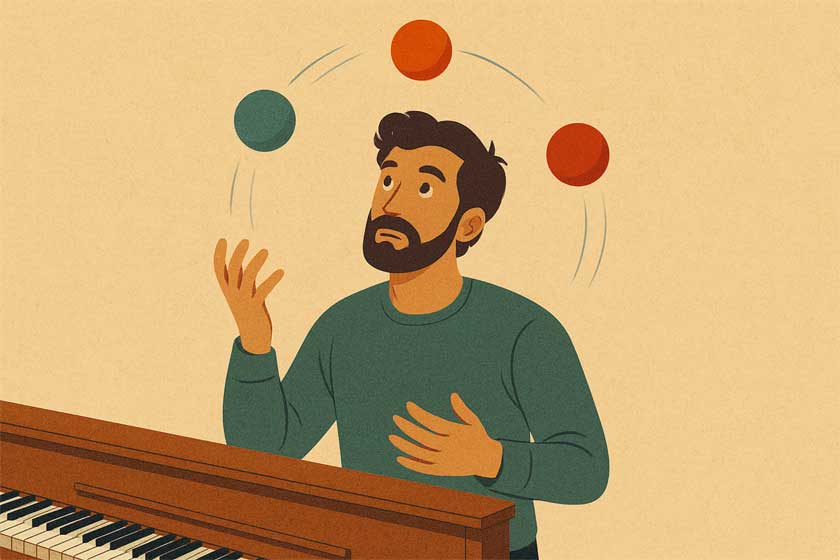If you want to learn piano or just get better, there’s one golden rule you need to remember:
The quickest way to improve your piano skills is through focused, repetitive practice.
It’s not flashy, it’s not glamorous — but it works. Every. Single. Time.
Whether you’re just starting your piano learning journey or returning after years away, you’ve probably hit a few frustrating moments. A tricky chord change. A rhythm that won’t settle. A section that makes your fingers rebel.
Here’s the fix: Isolate the hard part and repeat it. Over and over.
Why Repetition Is the Secret to Piano Progress
Too many beginners run through a song from start to finish, hoping that by some miracle the difficult bars will sort themselves out. Spoiler alert: they don’t.
Professional musicians, on the other hand, repeat those hard sections hundreds or even thousands of times. That’s how they build muscle memory for piano — so their hands just know what to do, even under pressure.
This is the key to improving at piano fast. Not talent. Not fancy gear. Just smart, focused repetition.
A Simple Piano Practice Routine That Works
Here’s how to improve at piano using a method that actually sticks:
- Find the problem spot – maybe 1 or 2 bars that trip you up.
- Slow it right down – tempo isn’t important yet.
- Repeat it – over and over, relaxed and focused.
- Come back tomorrow and do it again. Then again the next day.
After a few days, you’ll be shocked at how much easier that section feels. That’s the magic of building muscle memory.
Pro tip: Repeating an entire song when only 10% of it is hard won’t fix the problem. You’re just repeating the mistake.
Piano Practice Is Like Learning to Juggle
Let’s say you wanted to learn to juggle. But every time you dropped a ball, you stopped and went off to do something else for a few minutes. Then you came back and tried again for 30 seconds.
Would that be effective?
Nope. But this is how a lot of beginners approach their piano practice routine — constantly switching focus instead of giving attention to the one thing that needs it.
If you spend just 5 minutes repeating a tough chord change or rhythm, you’ll make more progress than 30 unfocused minutes skipping over it.
The Fast Track to Piano Mastery Is Slow and Steady
Mistakes are fine. In fact, they’re part of the deal.
So when you sit down to practice piano, don’t worry about playing it perfectly right away. Worry about playing it intentionally and repeatedly. That’s how you train your fingers to obey your musical wishes.
Final Thoughts: Keep Repeating, Keep Improving
If you’re wondering how to learn piano more effectively, or how to stop struggling with certain songs, remember this:
ISOLATE. REPEAT. RELAX. REPEAT AGAIN.
That’s it. That’s the magic formula.
Stick with it for a few days and watch your fingers start to dance.
Want more piano practice tips for beginners?
Subscribe for free lessons, technique tips, and motivation to help you learn piano the smart way.
Want a structured path to apply this? Try our Learn Piano Online plan.



1 Comment. Leave new
I have purchased the Piano For All piano method and I really enjoy using it. This website also is really helpful for all levels of piano players.
Is it possible to slow down the videos or lessons in the Piano for all for easy play along?
Thank you.